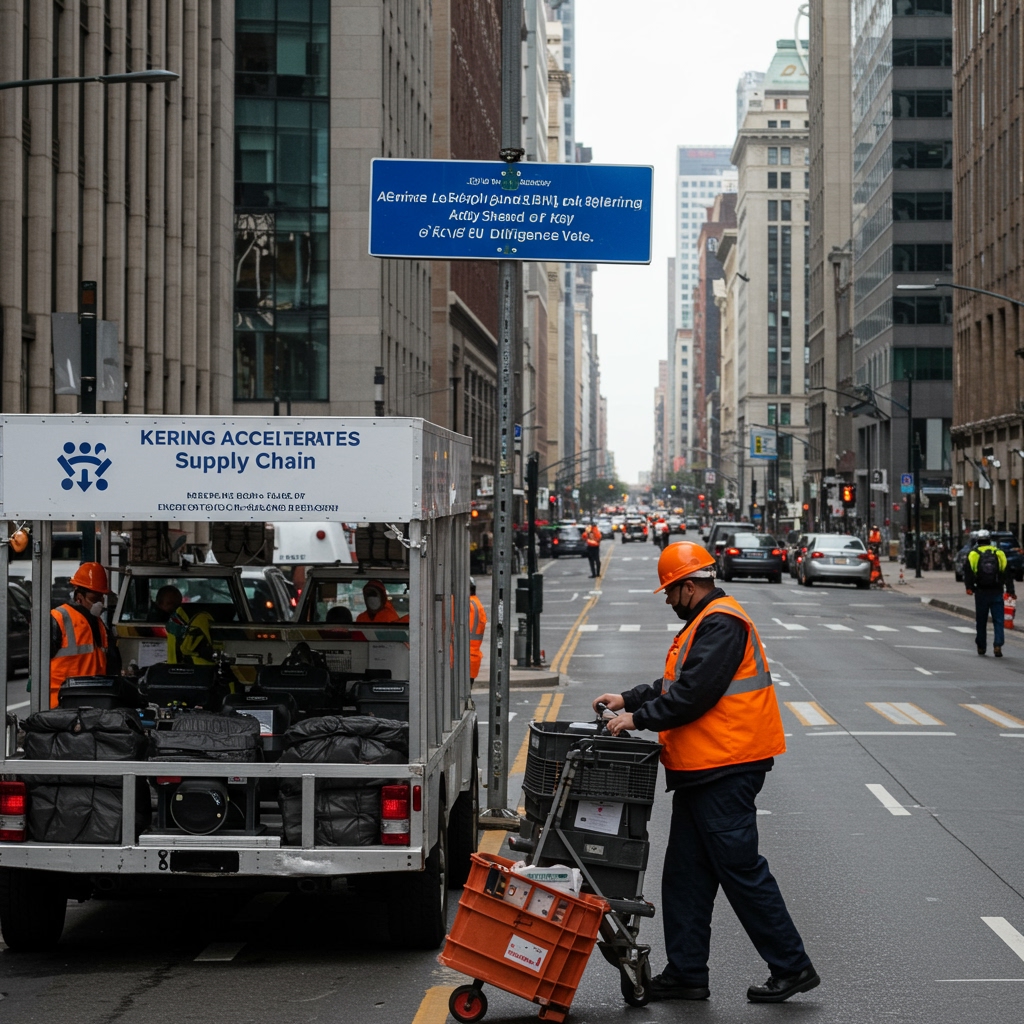Kering Unveils Sweeping Supply Chain Transparency Drive
Paris, France – Kering Group, the esteemed luxury conglomerate housing iconic brands such as Gucci and Yves Saint Laurent, today announced significant advancements in its global supply chain transparency measures. This strategic move comes at a pivotal time, specifically ahead of a potential vote on a landmark new EU Supply Chain Due Diligence Directive, currently anticipated for late May 2025. The initiative underscores Kering’s proactive approach to addressing mounting external pressures, ranging from increasing consumer demand for ethical sourcing to impending regulatory landscapes emanating from Brussels.
Piloting Cutting-Edge Blockchain Technology for Material Tracing
A cornerstone of Kering’s newly unveiled transparency program is the piloting of cutting-edge blockchain technology. This innovative approach is specifically targeted at tracing key raw materials that form the foundation of many luxury goods. Initially, the focus will be placed on materials like cotton and leather. The group aims to have this blockchain pilot operational across specific product lines by Q4 2025. By leveraging blockchain, Kering seeks to create an immutable and verifiable digital ledger of a material’s journey, from its origin point through various stages of processing and manufacturing. This level of granular traceability is intended to provide unprecedented clarity on the provenance and handling of critical components within their supply chain.
Strategic Rationale: Consumer Trust and Regulatory Alignment
Speaking at a press briefing held in Paris to detail the initiative, CEO François-Henri Pinault articulated the dual strategic imperative driving these enhanced measures. Firstly, he highlighted the significant and growing consumer demand for greater transparency regarding the ethical and environmental impact of the products they purchase. Modern consumers, particularly in the luxury sector, are increasingly conscious of sustainability issues and expect brands to demonstrate accountability for their supply chains. By proactively offering enhanced visibility, Kering aims to build and reinforce trust with its global customer base, positioning itself as a leader in responsible luxury.
Secondly, Mr. Pinault explicitly linked the announcement to anticipated regulatory requirements. The proposed EU Supply Chain Due Diligence Directive signals a clear intent from European legislators to impose mandatory human rights and environmental due diligence obligations on large companies operating within the EU market. While the directive’s final text and adoption timeline are subject to ongoing political processes, the expectation of a potential vote in late May 2025 underscores the urgency felt by corporations like Kering to align their practices. By acting ahead of potential mandates from Brussels, Kering is positioning itself to not only meet future compliance standards but potentially influence best practices within the industry.
Focusing on High-Risk Areas Identified in Sustainability Reporting
The initial phase of Kering’s expanded transparency program will strategically concentrate on areas identified as presenting higher risks in the company’s most recent sustainability assessment. The 2024 sustainability report evidently pinpointed specific segments or regions within the vast Kering supply network where challenges related to ethical sourcing, environmental impact, or labor practices may be more pronounced. By focusing early efforts on these segments, Kering aims to address potential vulnerabilities and ensure robust oversight where it is most needed.
This initial focus includes suppliers situated in key sourcing regions within Asia and Africa. Supply chains originating from these continents are often complex, involving multiple tiers of suppliers and diverse socio-economic contexts, which can sometimes present heightened risks regarding labor conditions, resource management, or environmental compliance. Kering’s targeted approach signifies an acknowledgment of these complexities and a commitment to applying enhanced due diligence in these specific geographies.
Navigating Complex Global Supply Networks
Operating a luxury goods business involves navigating intricate global supply networks that stretch across continents. Raw materials like cotton and leather are sourced from diverse locations, undergo processing in various facilities, and are then transformed into finished goods through complex manufacturing processes, often involving numerous specialized suppliers. Implementing comprehensive traceability, especially down to the raw material level, presents significant logistical and technical challenges. Blockchain technology, in this context, is being explored as a potential solution to overcome some of the inherent difficulties in mapping and monitoring these multi-layered supply chains effectively.
Industry-Wide Shift Towards Greater Accountability
Kering’s announcement is not an isolated event but rather reflects a broader trend unfolding across the fashion and luxury goods sectors. The company’s move follows similar announcements from other major fashion conglomerates that are also grappling with increasing regulatory pressure and consumer expectations regarding supply chain responsibility. The anticipation of directives like the EU Supply Chain Due Diligence Directive is acting as a catalyst, prompting many industry players to re-evaluate and strengthen their ethical sourcing and transparency frameworks. This collective movement indicates a significant shift towards greater accountability within an industry that has historically faced criticism over its supply chain practices.
Future Implications and Long-Term Vision
The success and scalability of Kering’s pilot programs, particularly the blockchain initiative for cotton and leather, could have significant implications for the company’s future operations and potentially serve as a model for the wider industry. A truly transparent supply chain enables companies to better identify and mitigate risks, verify ethical labor practices, track environmental impacts, and respond effectively to consumer and regulatory demands. It represents a fundamental shift towards a more responsible and sustainable business model, which is becoming increasingly non-negotiable in the global marketplace.
In conclusion, Kering Group’s decision to accelerate its supply chain transparency initiatives, including the strategic piloting of blockchain technology by Q4 2025, marks a significant step. Driven by the dual forces of increasing consumer conscientiousness and the looming prospect of mandatory due diligence legislation from Brussels, notably the anticipated EU Supply Chain Due Diligence Directive vote in late May 2025, the luxury group is positioning itself at the forefront of industry efforts to enhance accountability and sustainability within its complex global operations, particularly in high-risk areas identified in its 2024 sustainability report, impacting suppliers in Asia and Africa. This move aligns with a growing industry imperative for greater visibility and ethical responsibility, a trend that is rapidly reshaping the future of luxury and fashion.





